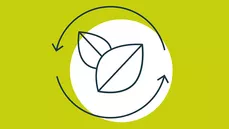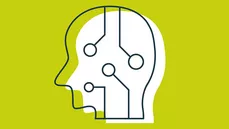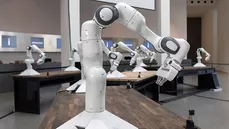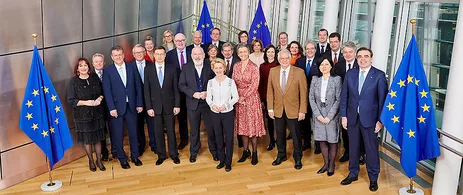The new European Commission under President Ursula von der Leyen (Germany) started its work on December 1, 2019. Under the theme, 'A Union that strives for more’, Von der Leyen and 26 commissioners from all over Europe have started their tasks for the next five years. A total of six priorities will serve as the guiding principle for their program. But what will this mean for the future of the European research and university landscape?
In addition to the 'European Green Deal', 'An economy that works for people' and 'A Europe fit for the digital age', the new Commission also defined ‘Promoting our European way of life ',' A stronger Europe in the world 'and ' A new push for European democracy ' as at the center of their work.

The knowledge triangle steered under one roof
If you look at the priorities of the Von der Leyen Commission, two priorities are of particular interest to the research landscape in Europe. With the European Green Deal, the Commission intends to take measures to transform Europe into a climate-neutral continent by 2050. To this end, the Commission wants to curb pollution, develop clean products and technologies, strengthen the circular economy, and decarbonize buildings and mobility. The focus of 'A Europe fit for the digital age' is data protection, better access to goods and services and the right environment for digital networks.
The future European Framework Program for Research and Innovation (Horizon Europe) will play a key role in providing scientific ideas for these issues. Here, the priorities of the Commission are translated into calls for proposals. In order for research, innovation, and education to interlock even more efficiently in the future, the entire knowledge triangle will be managed under one roof in the next five years: Mariya Gabriel (Bulgaria) is the new Commissioner for Innovation, Research, Culture, Education, and Youth. In this role, she will not only be responsible for Horizon Europe, but also for the future Erasmus program generation.

EuroTech: An alliance that strives for more
Since 2015, the EuroTech Universities Alliance has anchored its activities in fast developing research and innovation areas, where the partner universities offer complementary strengths in education and research. Areas, which are of high relevance to Europe’s industrial leadership, as they have the potential to provide solutions to the grand societal challenges of the 21st century. Combining excellent talent and unique learning and research environments, the EuroTech Universities engage in establishing dynamic, interdisciplinary networks with active participation of faculty, students, and industrial partners.
To increase their impact, the six institutions’ presidents jointly defined new Focus Areas for their collaboration: ‘Sustainable Society’, ‘AI for Engineering Systems’ and ‘Additive Manufacturing’. These new fields share a strong sustainability focus and will complement the successful existing focus areas ‘Health and Bio Engineering’ and ‘Innovation and Entrepreneurship’.

TUM looks at solutions for Europe's big challenges
In the Agenda 2030, the future concept of TUM – a founding member of the EuroTech Universities Alliance –, different scientific focus topics and restructurings are set out that will put TUM in an excellent position in order to respond to modern issues in an agile and efficient manner together with its strong partners.
With its agenda TUM.Additive, TUM is kicking off a comprehensive research focus on additive manufacturing. Together with high-tech partners in industry, TUM founded the ‘Bavarian Additive Manufacturing Cluster’ with the aim of establishing Bavaria as the prominent economic region for (digital) manufacturing technologies. Computer science, robotics and machine intelligence are also central research areas at TUM. Numerous outstanding scientists conduct research at the Munich School of Robotics and Machine Intelligence (MSRM), founded in 2017. In addition, TUM established a new research institute for ethics in artificial intelligence in 2019. The Campus Straubing for Biotechnology and Sustainability is one of five Integrative Research Centers at TUM. Its focus in research and teaching makes the new center unique: It will concentrate on renewable resources, biotechnology and bioeconomy. For this, unique interdisciplinary degree programs will be established that are only offered by TUM in Straubing.
Conclusion: EuroTech is well positioned for common goals
With their focus themes and centers, researchers at TUM are well positioned to find solutions for the priorities of the new EU Commission and the major societal challenges in Europe. Together with the partners of the EuroTech Universities Alliance and the newly defined Focus Areas of the Alliance, TUM is in an excellent position to be able to achieve impact for Europe that goes hand in hand with the EU’s political priorities. Together, excellent scientists from all six partners will develop new technologies in the future fields. For this purpose, the Brussels liaison office regularly hosts workshops to encourage cooperation on various topics. In addition, a joint office in Europe's capital guarantees that TUM is in constant exchange with the European institutions.
Sources:
- https://ec.europa.eu/commission/presscorner/detail/de/IP_19_5542
- https://ec.europa.eu/info/strategy/priorities-2019-2024_de
- https://ec.europa.eu/commission/presscorner/detail/de/fs_19_6714
- https://ec.europa.eu/info/priorities/europe-fit-digital-age_de
- https://www.tum.de/nc/die-tum/aktuelles/pressemitteilungen/details/35729/
- https://www.tum.de/die-tum/die-universitaet/standorte/campus-straubing/
